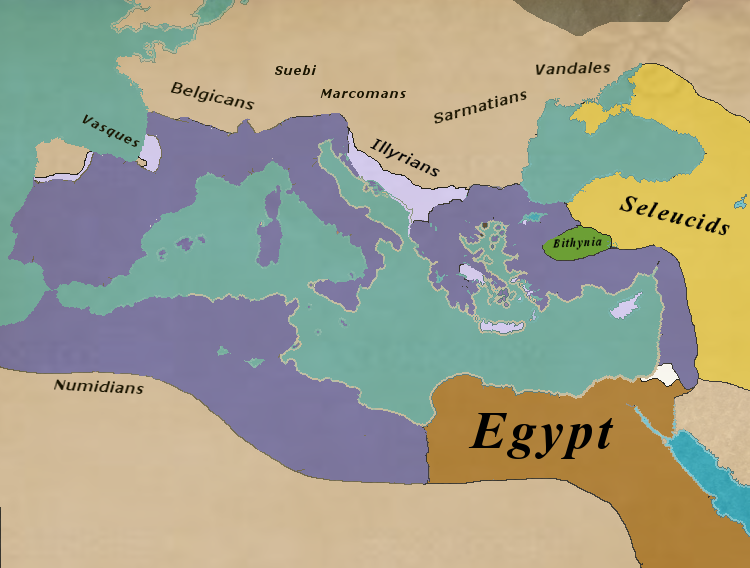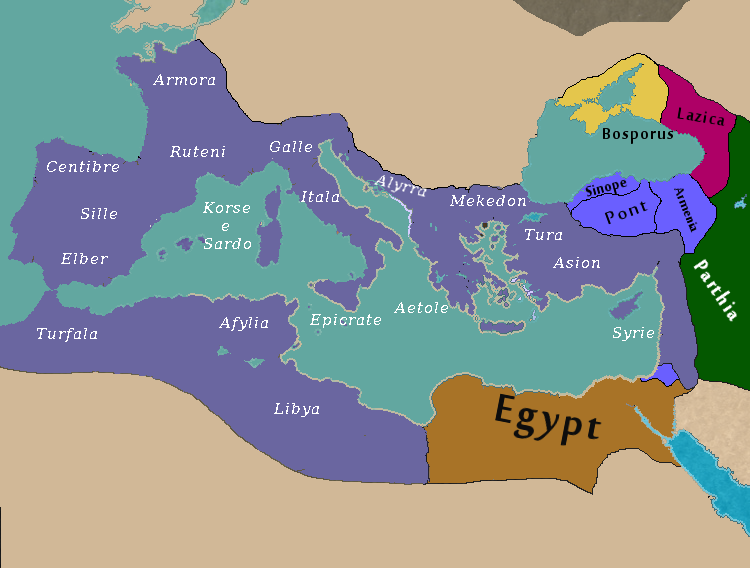Napatera Chronicles
- Thread starter TheTjord
- Start date
-
We have updated our Community Code of Conduct. Please read through the new rules for the forum that are an integral part of Paradox Interactive’s User Agreement.
You are using an out of date browser. It may not display this or other websites correctly.
You should upgrade or use an alternative browser.
You should upgrade or use an alternative browser.
INNER FIRE
Small kingdom of Judea was contested for centuries between great Hellenic powers. Defiant inhabitants launched multiple rebellions against Ptolemies, Seleucids and Antigonids, but until 1st century BC they never managed to recreate kingdom of David and Solomon. But under Janneus Macchabeus Jews were able to finally enjoy few years out of Greek tyranny. But vacuum left by Anrtigonids was quickly filled by Egyptians, who around 95 BC finally subdued border kingdom.
But at that time Orentian power was already established in the region. Orentians were looking for opportunity to drive wedge between Egypt and Seleukeia, and since both empires coveted Judea, it looked like a perfect pretext to isolate allies. On the other side, Jews looked upon Orenta with hope, as Orentian administration in Syria was quite benevolent. Governor of the province, Hastos Baalid was an excellent man with political insight necessary for such crucial position. His continuous support for rebels in Judea forced Egyptian hand when Seleucids were unprepared for major conflict.
Egyptian offensive began in spring 88 BC, as powerful force smashed army led by Tigillas Napatera that tried to intercept them near village of Gibeon. it was powerful blow to Orentian military potential in the region and Egyptian forces quickly captured most of the major fortresses south of Damascus. Orentian response was especially weak as High Priest Bodastar died around that time. Fortunately for Orenta, various faction quickly agreed to compromise on his succession, and chose Ilbani Napatera, experienced and respected statesman for his succession. Although already old and ill, Ilbani was able to calm down firebrands and mount major defense efforts against Egyptians.

Egyptians surprrsed Orenta with effective use of War Elephants. Orentians themselves used those animals in warfare, but only as an auxillary forces in African zilas. In battle of Gibeon, epelhants completely smashed ranks of Orentian infantry, allowing mobile Egyptian units to penetrate. In petty act of revenge, as Orentians captured Nile Delta, they killed hundreds of captured elephants.
As Egyptians marched in Syria, Orentian attention was focused on Greece. Major Egyptian allies there, especially Egypt were crucial for Orentian strategy As regime in Alexandria offered no support for its allies, Orentian forces swiftly moved to capture Athens, and then proceeded to occupy Dodecanese.
In 86 BC governor Hastis finally stopped Egyptian offensive near Damascus. Reinforcements started to arrive to Syria and Egyptians found themselves overwhelmed in numbers. But their greatest defeat in this phase of war occurred near Alexandria itself, as Egyptian fleet was demolished when trying to break through blockade. Isolated from the world, Egypt soon came to regret their decision to attack.
War wasn't exactly easy for Orenta though. Theopublic never had opportunity to engage in major conflict in such distant realm and it's supply lines were overextended. Economic crisis and unrest prevented more armies to be sent to Syria Ilbani Napatra died in 84 BC and his successor, Tygillon was not as charismatic and capable as his predecessor. But slowly Orentian forces were able to enter Egyptian territory, although no major successes were achieved until 82 BC.
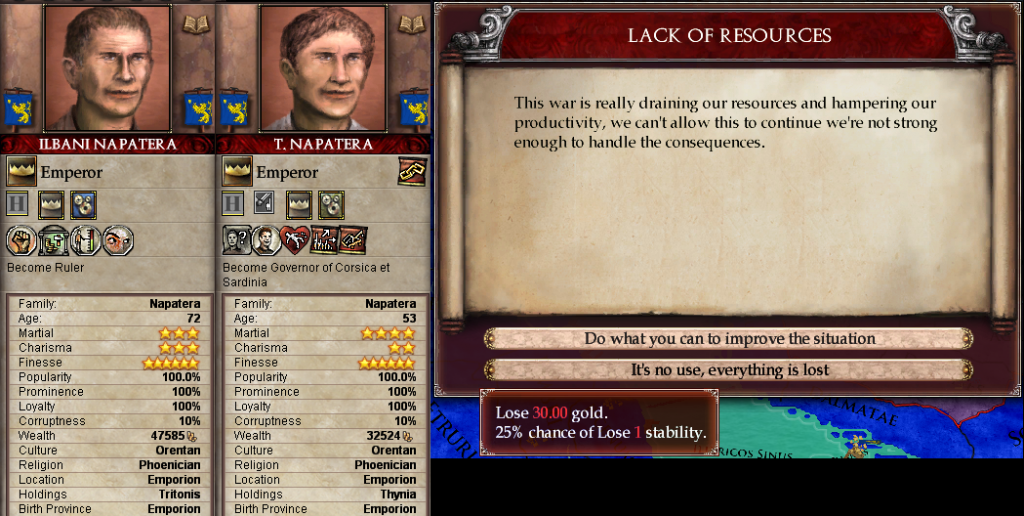
Weak leaders were plague of late Theopublic period. There was no shortage of talents in Napatera family, as it grew into six major branches, but patricians usually chose those less capable for High Priest office. Patricians themselves, entrenched in the past were ineffective and their only political skill was managing plabeians in capital. Militarists detested this state of affairs and many tried to change it not out of personal ambitions, but genuine concern for the Theopublic.
In that year, Orentian military was finally able to send major expedition towards Egypt itself. led by young Matten Napatera, Orentians surprised Egyptians by making landings in Nile Delta. Egyptians managed to mount successful defence of their capital, but Egypt’s economy was severely crippled as Matten secured territories down to Memphis. It seemed that only miracle can save Egypt from becoming another province of Orenta.
But miracle somewhow happened. In 81 BC, famine started spreading from Syria down to Africa. When greek-sponsored pirates threatened sealanes, Matten’s army was forced to retreat from the delta. In Cyraneica, Egyptian army was able to defeat starved Orentians and push them back to Carthage. As Orentian treasury was empty after years of warfare, public unrest began spreading. Tygillon was forced to make unpopular decision and make peace that was not as favorable as it was expected.

Brothers User and Matten Napatera were responsible for plan that many deemed reckless. Assault of Nile Delta was most ambitious amphibious operation of antiquity and resulted in major success, as Egyptian economy was severely crippled. That success was however reversed by infighting in capital, as their army wasn't supplied and reinforced for years. Both User and Matten after war entered politics as an war heroes, with only one aim - toppling the ruling class.
In Peace of Kandia, Egypt agreed to pull off the Greece and secede Dodecanese to Orenta. Rump Kingdom of Judea was restored, albeit both powers retained strong influence over it’s government. Athens were severely punished and their walls razed, but Egypt itself was saved. But Ptolemaic Kingdom now was only a shadow of it’s former glory. Instability, weak economy and constant internal turmoil turned once proud power into second-rate country, unable to threaten Orenta ever again. But for Orentians themselves, what was important was that Seleucid-Ptolemaic alliance was finally broken. Without that threat looming, Orenta was able to pursue further conquest uncontested. Final vestige of Greek independence, Crete, was finally annexed in 77 BC.

Peace of Kandia effectively turned Mediterranean into internal sea of Orenta. This allowed trade to flourish and improved communications between various arts of the Theopublic. Greek influence over west intensified. Around that time, School of Argo was founded and soon became major cultural institution in the country. In 70 BC Audral the Older published first major book on language, while two years later Cato of Rivia presented High Priest with his collection of dramas. Both men were later named as "fathers of Orentian language"
However, Orenta also wasn't free of internal problems. Exploitation of Greece and war spoils gave birth to new class of plebeian nobility, mostly of Italian and African origin, that sought reforms and rapid advance in society. Government tried to simply bribe them with land and empty offices, but what worked with tribal allies did not work with more diverse and organised group. This new nobility aligned mostly with militarists.
Tygillon and patricians were not strong enough to prevent their enemies from dominating the politics. Militarists were fortunately not unified camp; as every major general owned his own camp with distinct agenda. But High priest was not skilled diplomat and was unable to play one faction against another.
In provinces, regional governor’s power grew stronger. Many of them were former generals and possessed some degree of support in local Zilas. Provincial capitals in this period flourished as more tax money was poured into them, and new trade routes were established between east and west.
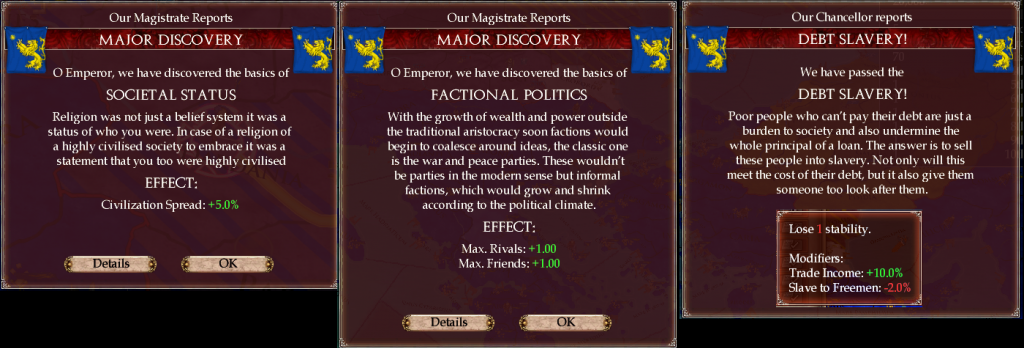
Orenta's thirst for slaves was endless. Even though victorious wars provided Theopublic with constant supply, there was always deficit of such commodity in internal markets. Slaves were most important part of Orentian economy. As stratification progressed, possession and number of slaves became symbol of societal status.
Encouraged by their successes in Egypt, generals sought new war - and they found one. Over last 100 years, there were new developments in the north. As Orenta and Egypt clashed, Seleucids defeated Sarmatian tribes in Crimea and recaptured what was once Greek Kingdom of Cimmeria. Sarmatias were close allies of Illyrians, the most strongest barbarian tribe on Orentian borders. Their migrations, pushed further by arrival of Germanic Vandales from up north, threatened stability in the region. Illyrian raids into Macedonia and Gallia intensified. In 75 BC they defeated retaliatory expedition of governor Mursul Euryponditd of Makedon, and executed five hundred Orentian soldiers.

Economic growth and advances in technology allowed more progress in military equipment. In late period of Theopublic, logistics became more and more sophisticated, while soldier in Zila started better, heavier armors. Ethbal was first to introduce heavy equipments to cavalry and such force proved decisive in Second Illyrian War. It was however only after war with Seleucids that heavy cavalry was introduced into all Zilas.
Two years later, two zilas undertook another expedition. Led by ambitious general Ethbal, Orentian soldiers employed devastating strategy. Their trail was marked with burned villages, vanquished fortresses and slaughtered women and children. With their own survival threatened, Illyrians were forced into unfavorable battles, in which they could not best Ethbal. Ethbal campaign led him right into Pannonian plains and it seemed that Illyria would be fully integrated into Orenta.
However, in 71 BC Ethbal was forced to retreat in anger. Around that time, Seleucid diplomats arrived to Orenta and threatened Theopublic with war should it not stop their expansion up north. There were many ready for such conflict, but Ethbal was viewed with fear and jealousy in capital, and government ordered his withdrawal. Ethbal’s soldiers returned with resentment towards Theopublic and it;s ruling class. Another civil war was brewing, and only Ethbal’s assassination in 68 BC prevented collapse of ineffective regime.
Small kingdom of Judea was contested for centuries between great Hellenic powers. Defiant inhabitants launched multiple rebellions against Ptolemies, Seleucids and Antigonids, but until 1st century BC they never managed to recreate kingdom of David and Solomon. But under Janneus Macchabeus Jews were able to finally enjoy few years out of Greek tyranny. But vacuum left by Anrtigonids was quickly filled by Egyptians, who around 95 BC finally subdued border kingdom.
But at that time Orentian power was already established in the region. Orentians were looking for opportunity to drive wedge between Egypt and Seleukeia, and since both empires coveted Judea, it looked like a perfect pretext to isolate allies. On the other side, Jews looked upon Orenta with hope, as Orentian administration in Syria was quite benevolent. Governor of the province, Hastos Baalid was an excellent man with political insight necessary for such crucial position. His continuous support for rebels in Judea forced Egyptian hand when Seleucids were unprepared for major conflict.
Egyptian offensive began in spring 88 BC, as powerful force smashed army led by Tigillas Napatera that tried to intercept them near village of Gibeon. it was powerful blow to Orentian military potential in the region and Egyptian forces quickly captured most of the major fortresses south of Damascus. Orentian response was especially weak as High Priest Bodastar died around that time. Fortunately for Orenta, various faction quickly agreed to compromise on his succession, and chose Ilbani Napatera, experienced and respected statesman for his succession. Although already old and ill, Ilbani was able to calm down firebrands and mount major defense efforts against Egyptians.

Egyptians surprrsed Orenta with effective use of War Elephants. Orentians themselves used those animals in warfare, but only as an auxillary forces in African zilas. In battle of Gibeon, epelhants completely smashed ranks of Orentian infantry, allowing mobile Egyptian units to penetrate. In petty act of revenge, as Orentians captured Nile Delta, they killed hundreds of captured elephants.
As Egyptians marched in Syria, Orentian attention was focused on Greece. Major Egyptian allies there, especially Egypt were crucial for Orentian strategy As regime in Alexandria offered no support for its allies, Orentian forces swiftly moved to capture Athens, and then proceeded to occupy Dodecanese.
In 86 BC governor Hastis finally stopped Egyptian offensive near Damascus. Reinforcements started to arrive to Syria and Egyptians found themselves overwhelmed in numbers. But their greatest defeat in this phase of war occurred near Alexandria itself, as Egyptian fleet was demolished when trying to break through blockade. Isolated from the world, Egypt soon came to regret their decision to attack.
War wasn't exactly easy for Orenta though. Theopublic never had opportunity to engage in major conflict in such distant realm and it's supply lines were overextended. Economic crisis and unrest prevented more armies to be sent to Syria Ilbani Napatra died in 84 BC and his successor, Tygillon was not as charismatic and capable as his predecessor. But slowly Orentian forces were able to enter Egyptian territory, although no major successes were achieved until 82 BC.

Weak leaders were plague of late Theopublic period. There was no shortage of talents in Napatera family, as it grew into six major branches, but patricians usually chose those less capable for High Priest office. Patricians themselves, entrenched in the past were ineffective and their only political skill was managing plabeians in capital. Militarists detested this state of affairs and many tried to change it not out of personal ambitions, but genuine concern for the Theopublic.
In that year, Orentian military was finally able to send major expedition towards Egypt itself. led by young Matten Napatera, Orentians surprised Egyptians by making landings in Nile Delta. Egyptians managed to mount successful defence of their capital, but Egypt’s economy was severely crippled as Matten secured territories down to Memphis. It seemed that only miracle can save Egypt from becoming another province of Orenta.
But miracle somewhow happened. In 81 BC, famine started spreading from Syria down to Africa. When greek-sponsored pirates threatened sealanes, Matten’s army was forced to retreat from the delta. In Cyraneica, Egyptian army was able to defeat starved Orentians and push them back to Carthage. As Orentian treasury was empty after years of warfare, public unrest began spreading. Tygillon was forced to make unpopular decision and make peace that was not as favorable as it was expected.

Brothers User and Matten Napatera were responsible for plan that many deemed reckless. Assault of Nile Delta was most ambitious amphibious operation of antiquity and resulted in major success, as Egyptian economy was severely crippled. That success was however reversed by infighting in capital, as their army wasn't supplied and reinforced for years. Both User and Matten after war entered politics as an war heroes, with only one aim - toppling the ruling class.
In Peace of Kandia, Egypt agreed to pull off the Greece and secede Dodecanese to Orenta. Rump Kingdom of Judea was restored, albeit both powers retained strong influence over it’s government. Athens were severely punished and their walls razed, but Egypt itself was saved. But Ptolemaic Kingdom now was only a shadow of it’s former glory. Instability, weak economy and constant internal turmoil turned once proud power into second-rate country, unable to threaten Orenta ever again. But for Orentians themselves, what was important was that Seleucid-Ptolemaic alliance was finally broken. Without that threat looming, Orenta was able to pursue further conquest uncontested. Final vestige of Greek independence, Crete, was finally annexed in 77 BC.

Peace of Kandia effectively turned Mediterranean into internal sea of Orenta. This allowed trade to flourish and improved communications between various arts of the Theopublic. Greek influence over west intensified. Around that time, School of Argo was founded and soon became major cultural institution in the country. In 70 BC Audral the Older published first major book on language, while two years later Cato of Rivia presented High Priest with his collection of dramas. Both men were later named as "fathers of Orentian language"
However, Orenta also wasn't free of internal problems. Exploitation of Greece and war spoils gave birth to new class of plebeian nobility, mostly of Italian and African origin, that sought reforms and rapid advance in society. Government tried to simply bribe them with land and empty offices, but what worked with tribal allies did not work with more diverse and organised group. This new nobility aligned mostly with militarists.
Tygillon and patricians were not strong enough to prevent their enemies from dominating the politics. Militarists were fortunately not unified camp; as every major general owned his own camp with distinct agenda. But High priest was not skilled diplomat and was unable to play one faction against another.
In provinces, regional governor’s power grew stronger. Many of them were former generals and possessed some degree of support in local Zilas. Provincial capitals in this period flourished as more tax money was poured into them, and new trade routes were established between east and west.

Orenta's thirst for slaves was endless. Even though victorious wars provided Theopublic with constant supply, there was always deficit of such commodity in internal markets. Slaves were most important part of Orentian economy. As stratification progressed, possession and number of slaves became symbol of societal status.
Encouraged by their successes in Egypt, generals sought new war - and they found one. Over last 100 years, there were new developments in the north. As Orenta and Egypt clashed, Seleucids defeated Sarmatian tribes in Crimea and recaptured what was once Greek Kingdom of Cimmeria. Sarmatias were close allies of Illyrians, the most strongest barbarian tribe on Orentian borders. Their migrations, pushed further by arrival of Germanic Vandales from up north, threatened stability in the region. Illyrian raids into Macedonia and Gallia intensified. In 75 BC they defeated retaliatory expedition of governor Mursul Euryponditd of Makedon, and executed five hundred Orentian soldiers.

Economic growth and advances in technology allowed more progress in military equipment. In late period of Theopublic, logistics became more and more sophisticated, while soldier in Zila started better, heavier armors. Ethbal was first to introduce heavy equipments to cavalry and such force proved decisive in Second Illyrian War. It was however only after war with Seleucids that heavy cavalry was introduced into all Zilas.
Two years later, two zilas undertook another expedition. Led by ambitious general Ethbal, Orentian soldiers employed devastating strategy. Their trail was marked with burned villages, vanquished fortresses and slaughtered women and children. With their own survival threatened, Illyrians were forced into unfavorable battles, in which they could not best Ethbal. Ethbal campaign led him right into Pannonian plains and it seemed that Illyria would be fully integrated into Orenta.
However, in 71 BC Ethbal was forced to retreat in anger. Around that time, Seleucid diplomats arrived to Orenta and threatened Theopublic with war should it not stop their expansion up north. There were many ready for such conflict, but Ethbal was viewed with fear and jealousy in capital, and government ordered his withdrawal. Ethbal’s soldiers returned with resentment towards Theopublic and it;s ruling class. Another civil war was brewing, and only Ethbal’s assassination in 68 BC prevented collapse of ineffective regime.
It's good to see this still going strong! Looks like you're following the historical Roman progress of conquests, although Parthia has been far less successful than its historical counterpart.
BLOOD FOR THE BLOOD GODDESS
As general Ethbal was lying in his deathbed after being stabbed by soldier, temperature in capital city remained dangerously hot. Ethbal’ loyal officers attempted to coup the city and brutally murdered elderly Tygillon Napatera during council session, but were unable to spark a rebellion. Threatened by army, patricians and many moderate militarists united and elected a man that was capable of major reform that could save the system. User Napatera was a talented, charismatic commander and hero of war with Egypt. He and his brother Matten were extremely popular with plebs and soldiers. Unlike previous High Priests, they could exercise power practically without limits.
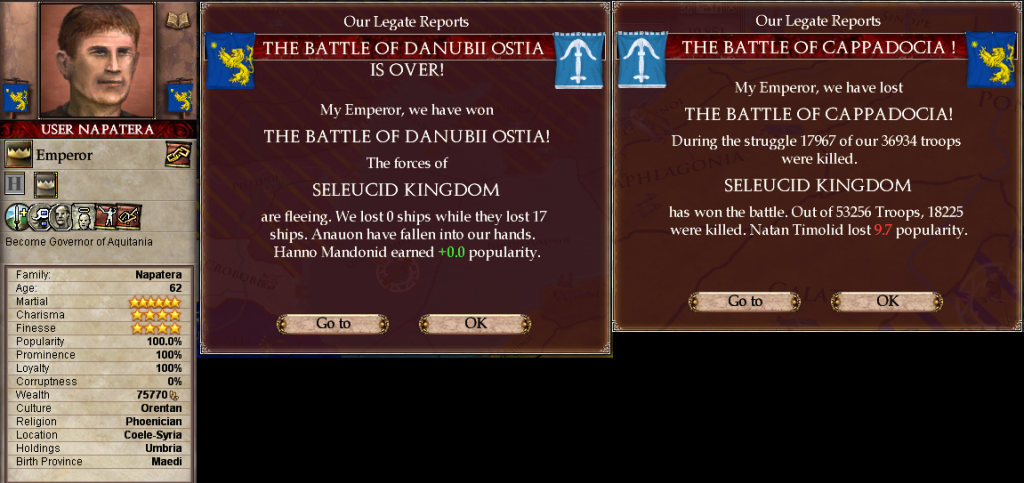
User and Matten came from oldest, Sone branch of Napatera family and were descedants of High Priest Audrusbal. As many families grew, so started practice of taking second, short surname to indicate branch family. Six branches of Napatera family were: Iaro, Mare, Boso, Tarte, Leo and Sone. Four of them died off in 1 century AD.
Many hoped that user and Matten will restore Orenta’ institutions to its former glory. Indeed, first months of User’s reign were promising. He was able to reconcile warring factions and subdue unruly governors. Opposition was bribed with lands and offices. User started construction of new temple dedicated to ishtar, hoping to reignite religious fervor that was so important during first centuries of Orenta.
Unfortunately, his capabilities were needed elsewhere. Seleucid Empire was still looming over Orenta right flak. This last great Hellenic power relied on momentum it gained through conquests up north to keep unity and stability in country. As Orenta was warring with Egypt and Illyrians, Seleucids managed to snatch many minor states in Asia Minor that were considered friendly to Orenta. Theopublic endured, as it needed time to prepare for war. Major incident happened however, as in 74 BC Seleucid fleet in Black Sea attacked and sank Orentian trading flotilla. Commander of Orentian forces in this region, Hanno in response defeated Seleucids near colony of Olbia, but war was imminent. In 73 BC Seleucid forces crossed the borders and besieged several fortresses in Syria. Meanwhile Governor Natan Timolid of Asion was forced to concede defense of Bithynia and Cappadocia, which were overran by Seleucids, which held major numerical advantage at this stage.
Indeed, Seleucids managed to muster over 150 000 soldiers for this war, which was number unheard of in ancient era. Most of them were badly equipped and untrained recruits, but Seleucid cavalry was without equals in this era. In response, Orenta mobilized four zilas, totaling over 100 000 soldiers, well equipped and trained. Many in city of Ishtar believed that victory could be achieved by means of swift maneuvers and deep operations like during Illyrian war.
But Anatolia and Syria was not only mountainous region, but also very well fortified. Both sides lacked in terms of siege equipment and rarely battle victories were converted into territorial gains. Over time, war dragged on and both sides bled out for minor gains. Around 69 BC, after string of victories under User Napatera himself Orentians finally prevailed, but ring of fortresses that protected Seleucid borders proved to be tough to penetrate.

Historian Omon in 1 century AD wrote that Orentian casualties in Seleucid War reached 200 000. Even though tis figure was probably vastly exaggerated, no other war in antiquity was as bloody as this one. Mountainous campaigns, famines, disease outbreaks and costly sieges reaped bloody harvest among both sides.
Over time, war became very unpopular among Orentian citizens. Casualties reached record high and many men from provinces were forcefully drafted, for a first time in their memory. Even though major fortress of Mazaca in Cappadocia finally surrendered to User in 67 BC, final victory seemed distant, especially since Seleucids managed to defeat Orentian forces in battle of Samsat. User himself died during smallpox outbreak which stopped Orentian offensive. His brother Matten was able to secure succession, but popular unrest grew stronger with years. Unfortunately for Orentians, they had no news of developments in the east, where Parthians attacked weakened Seleucids in Persia. After failed campaign in Pontus (65 BC) Orentians agreed to truce offer proposed by their enemy.
Direct Orentian gains were small: they retained Mazaca and some other minor fortresses in Asia Minor. Matten wanted to obtain more in peace deal, but that proved impossible as Seleucid Emprie collapsed after complete defeat against Parthians in Persia. Last Seleucid ruler Pankratios VI fled to Crimea where he was murdered by his advisors. Suddenly, most of Anatolia became basically no man’s land, but Parthians were moving swiftly. Matten decided to support former Seleucid governors and established net of client states that could protect Orentian interests in the region.
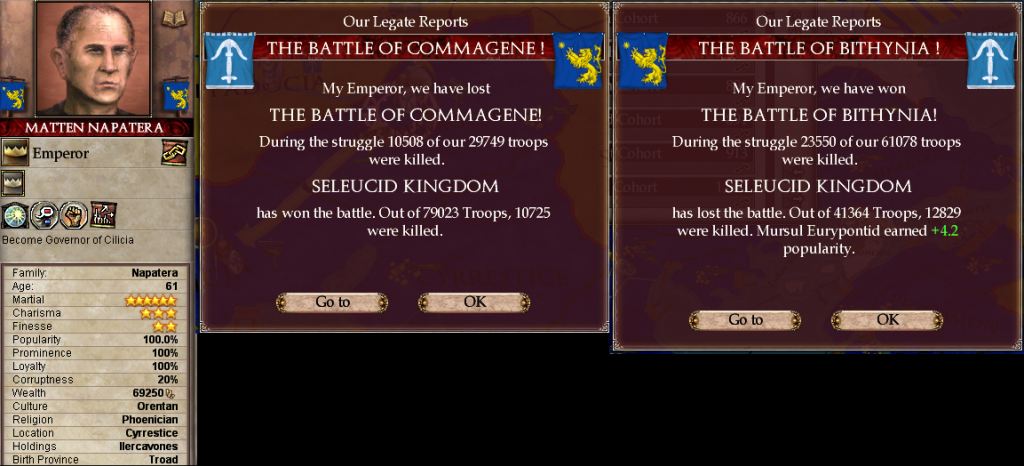
While his brother was brilliant, charismatic and popular, Matten's personality was stern and cold. Still, he was extremely capable commander that provided necessary leadership of Theopublic in times of need. He was also richest man in Orenta, but his lands were divided between fourteen kids he fathered with his wife.
As Parthians were organizing in the east, Matten was able to focus on internal matters. He continued User’s policy of strengthening High Priest position at expense of council. He appealed to plebeians by creating office of Plebeian Speaker, that represented lowest class in government. Another major change he bought was offering Orentian citizenship to many nobles in conquered territories, which could not only strengthen his powerbase, but also quell unrest in provinces. But those reforms were very unpopular with conservative aristocracy that bought User and Matten to power. In 62 BC Matten barely avoided assassination attempt, but gravely wounded and of old age he perished year later.
Still, Matten and User’s reforms could become foundations for Theopublic’s renaissance. Unfortunately, their successor was Bodassar Napatera, extremely wealthy man that simply bought himself into office. Bodassar wasn't foolish or incapable man. His greatest vice was religious fanaticism and belief that he was chosen by Ishtar to return Orenta to it’s old ways. During period of political and economic crisis , he focused mostly on religious affairs. One of his first acts as High Priest was ordering sacrifices of his political opponent’s children. This practice quickly became detested among not only nobility, but also general population of Orenta. That was because lowly priest soon followed their superior example, making no distinction between believers and non-believers.
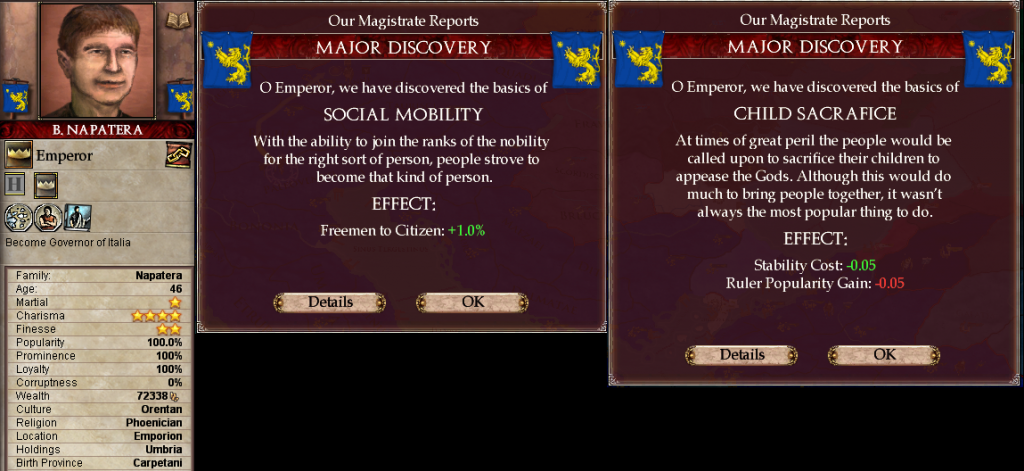
Bodassar was in reality a product of his age. Many before him called for religious renewal and expulsion of non-believers from city of Ishtar. They believed that policy of religious tolerance was cause of Ishtar's wrath and in result, droughts, famines, diseases and defeats that stuck Orenta over years. However, child sacrifice was never practiced in Orenta and many intellectuals decried Bodassar for his policies.
Meanwhile, Orenta faced another problems. Thousands of soldiers mobilized for Seleucid War became jobless, often unable to return to their past lives. Many of them migrated to cities, further enlarging ranks of unproductive proletariat. In Orenta itself social and sanitary became critical. one of few Bodassar’s achievements was foundations of first Aqueducts that provided city with water, but it wasn’t enough. Situation became more and more unstable and government’s grip on it grew weaker,which lead to widespread corruption. Bodassar’s only response was further sacrifices. Between 60 and 55 BC over five thousand children were sacrificed only in Orenta. But Ishtar’s thirst seemed endless.
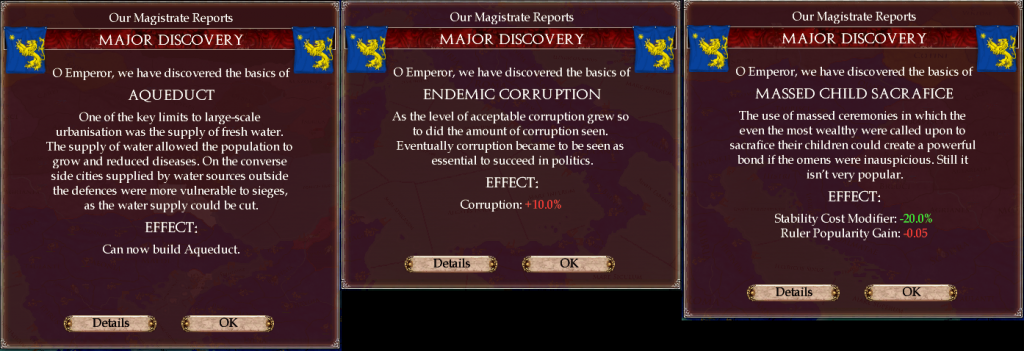
Around 20 BC, Orenta reached one million inhabitants. Most of them lived off charity in crude, unsanitary conditions. Patricians often bribed those masses into following them, but riots were common in suburbs.
The only rational solution was proposed by generals Hamilcar Maro Vibidus and Himilko Magoid, both veterans of Seleucid wars, yet young and ambitious. With Bodassar’s blessings they led two zilas up north. Tribes of Belgica seemed like easy prey for bloodthirsty Orentian soldiers, as they were losing ground to Germanic tribes in the east. In 56 BC Hamilcar became governor of Armora, province relentlessly raided by Belgicans for centuries. Without approval from capital, he immediately started military campaign against barbarians.
Probably no one in Orenta foreseen great success of Hamilcar and Himilko’s expeditions. Belgicans in the past were tough enemies for Orentians, mostly due to their excellent organization. But Orentian Army after Hellenic Wars was something tribal warriors could not fend off. Himilko defeated Belgican king Vercingetorix during battle of Sorbo (52 BC) and pursued him towards river Mosel. Meanwhile Hamilcar eradicated one Belgican encampment after another and received homages from the chieftains.
Hamilcar and Himilko’s successes at Gaul terrified patricians and Bodassar. Young, popular commanders leading strong army in vicinity of capital posed obvious threat towards central government. As their actions were also unlawful, council demanded their presence and trial. In 50 BC, riots erupted in several cities against Bodassar’s policies and practice of child sacrifice. Uprising was toppled in blood, but many rebels fled towards Belgica, seeking support from victorious generals. A year later Hamilcar stopped his campaign and declared that he will return to capital and answer before judges. What he didn’t mention was army of twenty thousand that were to accompany him to Orenta. In March 48 BC he crossed river Ter. The die has been cast.

Members of first triumvirate all came from different backgrounds. Hamilcar Vibidus was born into Apulian family with close ties to defeated Teate. They obtained Orentian citizenship around 120 BC as powerful landowners. Young and ambitious, Hamilcar gained many friend s during Illyrian and Seleucid Wars. On the other hands, Himilko came from minor Orentian nobility and started his service as mere cavalryman. On the other hand, Ilbani Tomo Bostarid was powerful patrician of distinguished lineage, whose family opposed Napateras for generations. Alliance of those three in 48 BC marked end of Theopublic.
As general Ethbal was lying in his deathbed after being stabbed by soldier, temperature in capital city remained dangerously hot. Ethbal’ loyal officers attempted to coup the city and brutally murdered elderly Tygillon Napatera during council session, but were unable to spark a rebellion. Threatened by army, patricians and many moderate militarists united and elected a man that was capable of major reform that could save the system. User Napatera was a talented, charismatic commander and hero of war with Egypt. He and his brother Matten were extremely popular with plebs and soldiers. Unlike previous High Priests, they could exercise power practically without limits.

User and Matten came from oldest, Sone branch of Napatera family and were descedants of High Priest Audrusbal. As many families grew, so started practice of taking second, short surname to indicate branch family. Six branches of Napatera family were: Iaro, Mare, Boso, Tarte, Leo and Sone. Four of them died off in 1 century AD.
Many hoped that user and Matten will restore Orenta’ institutions to its former glory. Indeed, first months of User’s reign were promising. He was able to reconcile warring factions and subdue unruly governors. Opposition was bribed with lands and offices. User started construction of new temple dedicated to ishtar, hoping to reignite religious fervor that was so important during first centuries of Orenta.
Unfortunately, his capabilities were needed elsewhere. Seleucid Empire was still looming over Orenta right flak. This last great Hellenic power relied on momentum it gained through conquests up north to keep unity and stability in country. As Orenta was warring with Egypt and Illyrians, Seleucids managed to snatch many minor states in Asia Minor that were considered friendly to Orenta. Theopublic endured, as it needed time to prepare for war. Major incident happened however, as in 74 BC Seleucid fleet in Black Sea attacked and sank Orentian trading flotilla. Commander of Orentian forces in this region, Hanno in response defeated Seleucids near colony of Olbia, but war was imminent. In 73 BC Seleucid forces crossed the borders and besieged several fortresses in Syria. Meanwhile Governor Natan Timolid of Asion was forced to concede defense of Bithynia and Cappadocia, which were overran by Seleucids, which held major numerical advantage at this stage.
Indeed, Seleucids managed to muster over 150 000 soldiers for this war, which was number unheard of in ancient era. Most of them were badly equipped and untrained recruits, but Seleucid cavalry was without equals in this era. In response, Orenta mobilized four zilas, totaling over 100 000 soldiers, well equipped and trained. Many in city of Ishtar believed that victory could be achieved by means of swift maneuvers and deep operations like during Illyrian war.
But Anatolia and Syria was not only mountainous region, but also very well fortified. Both sides lacked in terms of siege equipment and rarely battle victories were converted into territorial gains. Over time, war dragged on and both sides bled out for minor gains. Around 69 BC, after string of victories under User Napatera himself Orentians finally prevailed, but ring of fortresses that protected Seleucid borders proved to be tough to penetrate.

Historian Omon in 1 century AD wrote that Orentian casualties in Seleucid War reached 200 000. Even though tis figure was probably vastly exaggerated, no other war in antiquity was as bloody as this one. Mountainous campaigns, famines, disease outbreaks and costly sieges reaped bloody harvest among both sides.
Over time, war became very unpopular among Orentian citizens. Casualties reached record high and many men from provinces were forcefully drafted, for a first time in their memory. Even though major fortress of Mazaca in Cappadocia finally surrendered to User in 67 BC, final victory seemed distant, especially since Seleucids managed to defeat Orentian forces in battle of Samsat. User himself died during smallpox outbreak which stopped Orentian offensive. His brother Matten was able to secure succession, but popular unrest grew stronger with years. Unfortunately for Orentians, they had no news of developments in the east, where Parthians attacked weakened Seleucids in Persia. After failed campaign in Pontus (65 BC) Orentians agreed to truce offer proposed by their enemy.
Direct Orentian gains were small: they retained Mazaca and some other minor fortresses in Asia Minor. Matten wanted to obtain more in peace deal, but that proved impossible as Seleucid Emprie collapsed after complete defeat against Parthians in Persia. Last Seleucid ruler Pankratios VI fled to Crimea where he was murdered by his advisors. Suddenly, most of Anatolia became basically no man’s land, but Parthians were moving swiftly. Matten decided to support former Seleucid governors and established net of client states that could protect Orentian interests in the region.

While his brother was brilliant, charismatic and popular, Matten's personality was stern and cold. Still, he was extremely capable commander that provided necessary leadership of Theopublic in times of need. He was also richest man in Orenta, but his lands were divided between fourteen kids he fathered with his wife.
As Parthians were organizing in the east, Matten was able to focus on internal matters. He continued User’s policy of strengthening High Priest position at expense of council. He appealed to plebeians by creating office of Plebeian Speaker, that represented lowest class in government. Another major change he bought was offering Orentian citizenship to many nobles in conquered territories, which could not only strengthen his powerbase, but also quell unrest in provinces. But those reforms were very unpopular with conservative aristocracy that bought User and Matten to power. In 62 BC Matten barely avoided assassination attempt, but gravely wounded and of old age he perished year later.
Still, Matten and User’s reforms could become foundations for Theopublic’s renaissance. Unfortunately, their successor was Bodassar Napatera, extremely wealthy man that simply bought himself into office. Bodassar wasn't foolish or incapable man. His greatest vice was religious fanaticism and belief that he was chosen by Ishtar to return Orenta to it’s old ways. During period of political and economic crisis , he focused mostly on religious affairs. One of his first acts as High Priest was ordering sacrifices of his political opponent’s children. This practice quickly became detested among not only nobility, but also general population of Orenta. That was because lowly priest soon followed their superior example, making no distinction between believers and non-believers.

Bodassar was in reality a product of his age. Many before him called for religious renewal and expulsion of non-believers from city of Ishtar. They believed that policy of religious tolerance was cause of Ishtar's wrath and in result, droughts, famines, diseases and defeats that stuck Orenta over years. However, child sacrifice was never practiced in Orenta and many intellectuals decried Bodassar for his policies.
Meanwhile, Orenta faced another problems. Thousands of soldiers mobilized for Seleucid War became jobless, often unable to return to their past lives. Many of them migrated to cities, further enlarging ranks of unproductive proletariat. In Orenta itself social and sanitary became critical. one of few Bodassar’s achievements was foundations of first Aqueducts that provided city with water, but it wasn’t enough. Situation became more and more unstable and government’s grip on it grew weaker,which lead to widespread corruption. Bodassar’s only response was further sacrifices. Between 60 and 55 BC over five thousand children were sacrificed only in Orenta. But Ishtar’s thirst seemed endless.

Around 20 BC, Orenta reached one million inhabitants. Most of them lived off charity in crude, unsanitary conditions. Patricians often bribed those masses into following them, but riots were common in suburbs.
The only rational solution was proposed by generals Hamilcar Maro Vibidus and Himilko Magoid, both veterans of Seleucid wars, yet young and ambitious. With Bodassar’s blessings they led two zilas up north. Tribes of Belgica seemed like easy prey for bloodthirsty Orentian soldiers, as they were losing ground to Germanic tribes in the east. In 56 BC Hamilcar became governor of Armora, province relentlessly raided by Belgicans for centuries. Without approval from capital, he immediately started military campaign against barbarians.
Probably no one in Orenta foreseen great success of Hamilcar and Himilko’s expeditions. Belgicans in the past were tough enemies for Orentians, mostly due to their excellent organization. But Orentian Army after Hellenic Wars was something tribal warriors could not fend off. Himilko defeated Belgican king Vercingetorix during battle of Sorbo (52 BC) and pursued him towards river Mosel. Meanwhile Hamilcar eradicated one Belgican encampment after another and received homages from the chieftains.
Hamilcar and Himilko’s successes at Gaul terrified patricians and Bodassar. Young, popular commanders leading strong army in vicinity of capital posed obvious threat towards central government. As their actions were also unlawful, council demanded their presence and trial. In 50 BC, riots erupted in several cities against Bodassar’s policies and practice of child sacrifice. Uprising was toppled in blood, but many rebels fled towards Belgica, seeking support from victorious generals. A year later Hamilcar stopped his campaign and declared that he will return to capital and answer before judges. What he didn’t mention was army of twenty thousand that were to accompany him to Orenta. In March 48 BC he crossed river Ter. The die has been cast.

Members of first triumvirate all came from different backgrounds. Hamilcar Vibidus was born into Apulian family with close ties to defeated Teate. They obtained Orentian citizenship around 120 BC as powerful landowners. Young and ambitious, Hamilcar gained many friend s during Illyrian and Seleucid Wars. On the other hands, Himilko came from minor Orentian nobility and started his service as mere cavalryman. On the other hand, Ilbani Tomo Bostarid was powerful patrician of distinguished lineage, whose family opposed Napateras for generations. Alliance of those three in 48 BC marked end of Theopublic.
It certainly looks like there is going to be a civil war soon considering how much decadence and corruption has set in.


